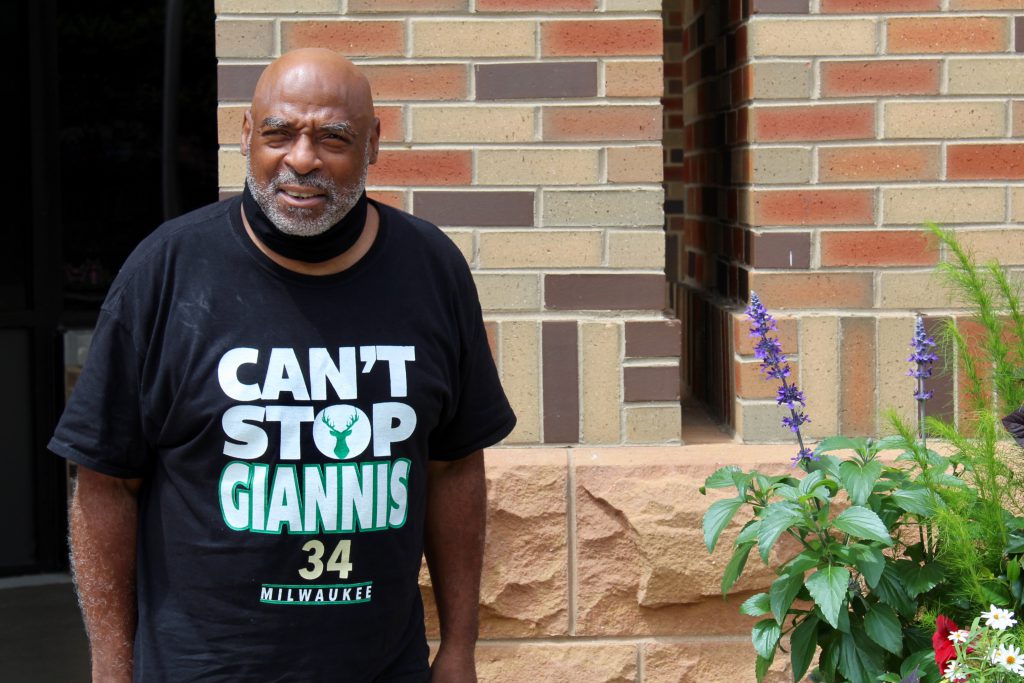Pandemic Aid Programs Are Failing Us
One man's story of resilience, navigating unemployment during COVID-19.

Victor Campbell has spent most his life lending his talents to other musicians. Now he’s using them to fight for better efficiency in Milwaukee’s emergency social programs. Photo provided by Victor Campbell/NSS.
Victor Campbell has been providing joy to others through music for years.
But after COVID-19 took away his source of income, the 62-year-old jazz drummer didn’t miss a beat.
He just shifted his focus to survival.
“I refuse to lose,” said Campbell, who was laid off from his job as a medical transit van driver and then denied unemployment benefits.
This loss of income left the Sherman Park resident struggling to pay his bills, so he applied for aid through the Wisconsin Rent Assistance Program in early June.
Determined not to be displaced, Campbell reached out to the New York-based Jazz Foundation of America and Los Angeles-based MusiCares. Both have programs that provide relief to musicians sidelined by the COVID-19 pandemic.
Campbell said both organizations provided him with help only a day after he called.
And he’s made it his mission to get programs in Milwaukee to be just as responsive.
“The system of resources in this city is a game,” Campbell said. “People are in need and are being given the runaround.”
The waiting game
For Campbell, the process in Milwaukee has been a constant cycle of calling. And waiting.
At one point, the Social Development Commission, which is one of two agencies in Milwaukee County administering the Wisconsin Rent Assistance Program, had a backlog of 24,000 names.
Campbell has written letters to county, city and state officials to address this issue. His letters have taken to task not only the Wisconsin Rent Assistance Program but also the Department of Workforce Development, which oversees unemployment compensation, and other agencies as well.
Campbell said he’s never been the type to wait for what he wants or needs.
“It is not fair for someone who has done everything right to have to wait weeks and even months to know if they will receive the help they need,” he said.
Those who know Campbell are not surprised by his resilience.
“Victor is a Jun-Jun drummer,” said Ferne Caulker, who has known Campbell for over 15 years and recently retired as artistic director of the Ko-Thi Dance Company “A big part of that is understanding what it is to be the foundation of something. I think that is a part of his personality.”
Though Caulker has known Campbell only as a musician, she’s not surprised he’s working to change things.
“He is one of the best jazz drummers in the city,” she said. “But he will still return to the ensemble to teach and learn from the younger generation, and that takes humility.”
For more than 56 years, Campbell has shared his talent with local legends such as Manty Ellis and Willie Higgins and with national acts like Tim Ries, Gary Richrath and The Drifters.
Making ends meet
The traveling musician returned home in 2013 to have hip surgery. He planned to get back on the road after recovery, but his goal was short-circuited when he found out he had to get surgery on both shoulders the next year.
Still not giving up on his dream, Campbell decided to get a day job driving medical transit vans until his shoulders healed properly and he could go back on the road. He has continued to play locally since he’s been back.
“Victor is ambitious, dedicated and loyal,” said John High, a pastor and close friend of Campbell’s. “If he thinks it’s affecting other people, he cares about it.”
According to High, who has played music with Campbell since 1981, Campbell comes from a line of people who advocate for themselves. Campbell’s father, Floyd Campbell, was among the first Black men to move to Mequon.
“I think his resilience might be a generational thing,” High said.
Regardless of the reason, Campbell plans to continue working toward changes that will help people like him.
“I will keep calling and writing and complaining until these programs restructure themselves into programs that actually help people,” he said.
This story was originally published by Milwaukee Neighborhood News Service, where you can find other stories reporting on fifteen city neighborhoods in Milwaukee.
More about the Coronavirus Pandemic
- Governors Tony Evers, JB Pritzker, Tim Walz, and Gretchen Whitmer Issue a Joint Statement Concerning Reports that Donald Trump Gave Russian Dictator Putin American COVID-19 Supplies - Gov. Tony Evers - Oct 11th, 2024
- MHD Release: Milwaukee Health Department Launches COVID-19 Wastewater Testing Dashboard - City of Milwaukee Health Department - Jan 23rd, 2024
- Milwaukee County Announces New Policies Related to COVID-19 Pandemic - County Executive David Crowley - May 9th, 2023
- DHS Details End of Emergency COVID-19 Response - Wisconsin Department of Health Services - Apr 26th, 2023
- Milwaukee Health Department Announces Upcoming Changes to COVID-19 Services - City of Milwaukee Health Department - Mar 17th, 2023
- Fitzgerald Applauds Passage of COVID-19 Origin Act - U.S. Rep. Scott Fitzgerald - Mar 10th, 2023
- DHS Expands Free COVID-19 Testing Program - Wisconsin Department of Health Services - Feb 10th, 2023
- MKE County: COVID-19 Hospitalizations Rising - Graham Kilmer - Jan 16th, 2023
- Not Enough Getting Bivalent Booster Shots, State Health Officials Warn - Gaby Vinick - Dec 26th, 2022
- Nearly All Wisconsinites Age 6 Months and Older Now Eligible for Updated COVID-19 Vaccine - Wisconsin Department of Health Services - Dec 15th, 2022
Read more about Coronavirus Pandemic here



















